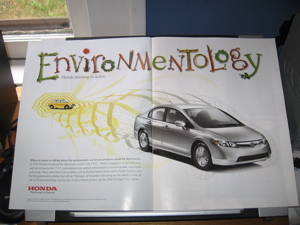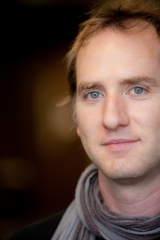Archive for the ‘worldchanging’ Category
Worldchanging.com Acquired by Architecture for Humanity
Well, the cat’s finally out of the bag — Architecture for Humanity has acquired my former employer Worldchanging.com. As a member of AfH’s Worldchanging transition advisory group, I’ve been sworn to secrecy for several months. But now I’m thrilled to be able to share this announcement with you:
Architecture for Humanity Acquires Worldchanging.
Will merge with the Open Architecture Network to develop a robust center for applied innovation and sustainable development.
San Francisco, CA (September 19, 2011) Architecture for Humanity is honored to announce the acquisition of Worldchanging, a leader in solutions-based journalism, and to merge its’ assets with the Open Architecture Network to create a robust and informed network to bring solutions to global challenges to life.
It’s an exciting match, since design increasingly includes discussions of policy and planning, communication, social justice and science; issues that once fell outside the traditional bounds of architecture are now at the heart of professional practice. Bringing these two worlds together is a logical next step in sustainable development.
Cameron Sinclair, Executive Director of Architecture for Humanity, says, “We are thrilled to connect with the Worldchanging community in order to expand the ways we can continue to make a difference across the world. Each project we do requires innovative solutions, resourcefulness, and passion. It’s a perfect fit.”
Architecture for Humanity is thankful to the Board of Directors of Worldchanging for their hard work in helping create a smooth transition.
“I am grateful to the Worldchanging Board of Directors for their active stewardship of Worldchanging during this transition” said Stephanie Pure, Board President of Worldchanging. “Thanks in part to this positive team effort, Worldchanging has a bright future with Architecture for Humanity.”
Over the next six months Architecture for Humanity plans to transform their current Open Architecture Network (www.openarchitecturenetwork.org, an on-line network that empowers architects, designers, builders and their clients to share architectural plans and drawings, into a robust platform that provides dialogue and tools to support a shared vision of a more sustainable future across sectors. The combined strength of these communities, both created out of the TED Prize, will help spur innovation, learning, and best practices.
The new site, which will be managed by an independent entity, will include project management tools, offer case studies on innovative solutions and provide tools for aid and development organizations evaluate their programs in the field.
“Last decade was about imagining the solutions that could help us meet big planetary problems,” said Worldchanging co-founder and former Executive Editor Alex Steffen. “This decade will be all about putting those solutions to work. This exciting new version of Worldchanging is set, I believe, to become the online epicenter of applied innovation.”
Over the summer, Architecture for Humanity met with over sixty writers, contributors, stakeholders and supporters to envision the transition of these sites. “Worldchanging has helped frame the global conversation on sustainability over the past seven years, and we couldn’t be more excited for Architecture for Humanity to take the reins and continue to push the boundaries of what we can achieve together,” Worldchanging co-founder Jamais Cascio noted “I can’t imagine Worldchanging being in better hands.”
Many of the original writers to Worldchanging, including co-founders Jamais Cascio and Alex Steffen, have signed up to contribute to the new site. We look forward to a bright green future together.
RIP: Worldchanging.com
 Dearly beloved, please join me in a moment of silence to honor the life and untimely passing of another member of our media family. On Monday, November 29, one of the most important websites of the past decade, Worldchanging.com, announced that it will close up shop by the end of 2010. The main reason? The non-profit organization never was able to achieve financial sustainability without editor Alex Steffen maintaining an insane schedule of speaking gigs (more than 400 in the past 5 years). I’m proud to have been involved with Worldchanging, as a fan, contributor, employee and friend. I will miss it dearly.
Dearly beloved, please join me in a moment of silence to honor the life and untimely passing of another member of our media family. On Monday, November 29, one of the most important websites of the past decade, Worldchanging.com, announced that it will close up shop by the end of 2010. The main reason? The non-profit organization never was able to achieve financial sustainability without editor Alex Steffen maintaining an insane schedule of speaking gigs (more than 400 in the past 5 years). I’m proud to have been involved with Worldchanging, as a fan, contributor, employee and friend. I will miss it dearly.
In its seven-year run, Worldchanging has been an important intellectual watering hole for people interested in the intersection of sustainability and innovation. Under the banner of “tools, models and ideas for building a better future” the site has produced an impressive archive of nearly 12,000 articles on a broad range of subjects, from architecture to agriculture, climate science to microfinance, nanotech to urban design. Fortunately, that archive will live on, says the announcement: “It is our goal to see the archive of work here maintained, though the form of that archive is still uncertain.” Also, a revised and updated edition of the bestselling 2006 book Worldchanging: A User’s Guide for the 21st Century is due out in March 2011.
Worldchanging served as both a launchpad for important new voices — like Cameron Sinclair, Dawn Danby, Sarah Rich, David Zaks and Anna Lappé, among many others — and a new platform for some venerable old hands — like Gil Friend, Terry Tempest Williams, Joel Makower, Jon Lebkowsky and Jay Walljasper. The list of contributors to the site and its eponymous book reads like a who’s who of some of the most respected thinkers and doers in sustainability circles. Worldchanging’s contribution to the public conversation about our common future is undeniable.
I first learned about Worldchanging shortly after its launch in 2003. The site quickly became my favorite source for story ideas about emerging trends in technology and social innovation during my last few years as a writer and editor at Utne Reader. I loved the focus on solutions that co-founders Alex Steffen and Jamais Cascio and their team brought to a range of subjects I care about deeply, which they nicely captured with the optimistic catchphrase “bright green.”
I went to work for Worldchanging in late 2006, when I left Utne Reader and moved to Seattle. I joined the team as Publisher, alongside Steffen as Editor (Cascio had left early that year), just before the launch of one of the organization’s crowning achievements, the 600-page book Worldchanging: A User’s Guide for the 21st Century, a compendium of ideas and solutions in the spirit of the old Whole Earth Catalog. The book would become a bestseller and was translated into French, German and several other languages.
We were trying to leverage the attention generated by the book, and the momentum from a major grant from the folks at TED, to grow the site from its origins as a group blog into a professional, multi-channel idea factory. And we wanted to do it our own way, bootstrapping our growth through a variety of diverse revenue streams without having to rely on the largesse of foundations or large donors (and avoiding the inevitable strings attached). We created a series of local blogs covering the green innovation scenes in places like LA, Chicago, Austin, New York, Minneapolis and Canada. And we had big dreams of launching audio and video podcasts, conferences, book series, and turning the contributor team into a speakers bureau and consulting team. My job was to focus on building new revenue streams — initially reader donations, content sponsorships, and ads — to facilitate that growth and ease the pressure on Alex to bring in speaking fees.
Our efforts saw modest success, though nothing anywhere near what we had hoped. I’ll admit that I wasn’t entirely ready for the role. I had some successful experience in both software sales and nonprofit fundraising. But I had no training or experience in media sales. I had agreed to unrealistically high revenue goals and had to learn on the job while setting up a sales operation entirely from scratch with no budget. There were other challenges inherent to the site’s content and the business model we were pursuing in an ad-driven media landscape, which I’ll elaborate on below.
In March of 2007, six months after I started, I left the staff mainly for personal reasons — my wife and I had moved to Guatemala to foster the baby boy we adopted later that year. In the three years since then, Worldchanging has continued to produce some of the best, most important content available, despite its continued financial struggles.
In the end, I believe Worldchanging’s demise was due in large part to the organization’s inability to craft a business model that could surmount several challenges endemic to the current ad-driven media ecosystem. (Again, I haven’t been privy to the inner workings of the organization for the past three years. So my analysis could be way off base, or at least out of date):
- Too General-Interest for Advertisers: In an era when sponsors insist on carving audiences into ever-smaller and more specialized niches, Worldchanging was never quite niche enough. The site was simply too broad, too eclectic, too general-interest for advertisers to fit into their ultra-narrow targeting algorithms. This is not a problem with the content, but with the advertising model. More financially successful sites in the green space focused heavily on a marketable niche, like product reviews (Treehugger), business (GreenBiz.com), architecture and design (Inhabitat) or green news and politics (Grist, which also had major foundation support and a 5-year headstart). We were also reluctant to go after most big corporate brands with large marketing budgets. We didn’t want to help them greenwash their images. And most of the cool green companies were too small and were spending all of their meager ad dollars on search engine ads. This is one of the great tragedies of the modern media ecosystem: general-interest publications, whether online or in print, simply can’t compete. It’s the shadow side of narrowcasting.
- Not Enough Traffic: Online, as in print, there basically are two ways to attract advertisers — scale and targeting. With enough traffic, you can overcome the niche problem. But we were never big enough to do that. And a couple months into my tenure at Worldchanging, after implementing several stats programs, we learned that our real traffic was significantly smaller than what our raw server logs were telling us. With more time and capital we might have successfully carved out a clearer niche in advertisers’ minds.
- The “Blog” Problem: Even with some of the brightest minds in the field writing for the site, and despite our efforts to reposition it as an online magazine, advertisers were reluctant to sponsor what they saw as a “blog” where most of the content came from volunteers with no editorial calendar or strong professional editorial filter. Advertisers crave predictability.
- Focus on Ideas: The site also suffered from its focus on ideas rather than products — something Utne Reader always struggled with as well. In the name of editorial integrity (to his credit), Alex steadfastly refused to add features like green product reviews — the sort of content advertisers will pay top dollar to sponsor. In 2007-08 there was a valiant attempt to appeal more to sponsors while maintaining editorial independence by introducing a stable of weekly columns, with writers paid to cover certain beats. I was gone by then and don’t know the details of the impact the move had, but obviously the new editorial model did not succeed in turning the Worldchanging ship around.
- Progressive Funders Reluctant to Fund Media: As my friend Bill Weaver says, media makers are the modern sorcerers. Changing the stories we tell can change the way people think. Yet foundations and investors interested in social change have never seemed to get the need to support media. Conservative foundations and corporations supporting the status quo got this long ago, which is why we’ve been outgunned for a generation by the right-wing media and punditocracy.
- The Economy: It sounds cliche now, but unfortunately it’s true. The cruelest irony of the Great Recession is that so many of the organizations that are rethinking our social, political and economic systems are entirely dependent on funding derived from the existing, unsustainable, consumption-driven economy. And those sources of funding are drying up on every front, whether it’s dwindling consumer spending, shrinking ad budgets, or cutbacks in foundation grants because of the downturn on Wall St.
I’m sad to have to write these words. Though just as sadly, I’m not surprised. Worldchanging changed my world in so many ways. My hat’s off to Alex, Jamais and all of the incredible visionaries who had a hand in this project over the past seven years. Thank you, thank you, and again, thank you. I look forward to seeing what we all created together live on in some form, and I wish you all success in whatever comes next.
“World-changing” is now a marketing term
My friends over at www.worldchanging.com will get a kick out of this. The inside front cover of the July/August issue of Sierra features a two-page ad for Honda’s Civic Hybrid. Under the banner “Environmentology” (not quite sure what that means, but it sounds nice) artistically rendered in images of plants, the company rightly touts its 32-year history as a fuel-efficiency innovator.

Here’s the passage that caught my eye:

In 1974, Honda introduced the ingeniously simple Civic CVCC. World-changing (sic) for its fuel efficiency and low emissions, the CVCC demonstrated our spirited commitment to environmentally responsible technology…
“World-changing”? Maybe. While Honda has been a leader in green car technology for a long time, it’s important to note that average fuel economy across the industry, even for Hondas, is unsustainably low. Appopriation and imitation are of course the sincerest forms of flattery. Kudos should go at the very least to Alex and Jamais at WC for changing the lexicon. It’s nice to see Madison Avenue’s taking notice.
